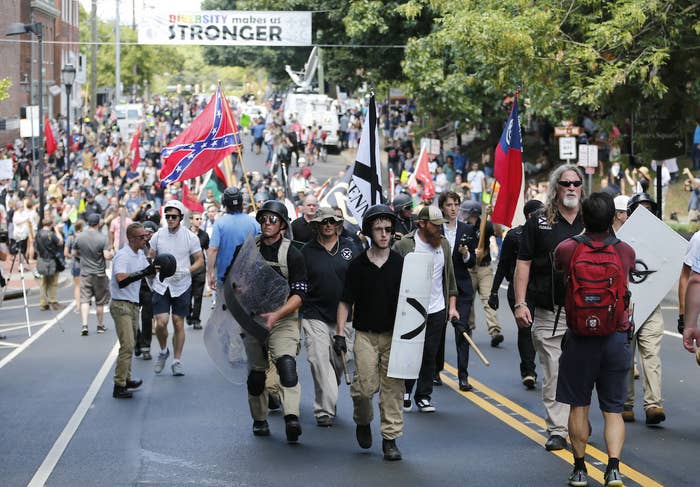
CHARLOTTESVILLE, Virginia — As a photo of blood streaming down her battered face was shown in the courtroom and memories of the worst day of her life came rushing back, Natalie Romero choked up and her voice cracked. Through tears, she described the moments before the image was taken, when a Dodge Challenger driven by a neo-Nazi plowed into a crowd of anti-racist demonstrators in 2017, killing one woman and injuring dozens of other people.
“I get hit and the next thing I know is just darkness and hearing a long beep and thumps,” Romero, 24, testified.
She described it like a scene from a war movie when a soldier is blown up by an explosion and the screen flashes before going dark.
“I couldn't see too much, but I just felt [blood] dripping and it's warm on my face,” she said. “I thought I was about to die.”
The attack recounted by Romero took place on Aug. 12, 2017. It was the deadly crescendo to a weekend of violence sparked by a rally of hundreds of neo-Nazis and other white supremacists angry over the planned removal of a Robert E. Lee monument. The car assault left Romero hospitalized with a fractured skull, a dead tooth, various cuts and bruises, and eventually acute anxiety and post-traumatic stress disorder.
She is one of nine survivors of the attack and violent events that preceded it who are suing the 24 organizers of the “Unite the Right” rally in Charlottesville on Aug. 11 and 12, 2017. Her testimony on Friday was the first of many expected in the landmark civil trial that will determine whether the group of far-right extremists conspired to commit racially motivated violence when they planned their rally and whether they should pay damages to the survivors.
Romero and the other plaintiffs filed the case in the months after the violence with the help of Integrity First for America, a civil rights nonprofit. Fighting for them in court is a high-powered, pro bono legal team. On the other side are the white supremacists and their attorneys, who admitted in opening statements to either being or defending people with First Amendment–protected abhorrent views who blame the violence on the Charlottesville police’s incompetence and counterprotesters who confronted them. They also deny any conspiracy existed.
On Friday morning, Romero, a former student at the University of Virginia, was the first witness to take the stand. She did so after several deep, labored breaths.
Karen Dunn, co-lead attorney for the plaintiffs, began her questioning. Then Romero told her story to the jury of 12 Charlottesville-area residents who will decide the case.
Romero, who is from Houston, told Dunn she had just arrived in Charlottesville for the start of the new school year on Aug. 11. She smiled briefly recalling the drive to campus. She stuck her head out the window “like a dog,” taking in the fresh air.
“I took my last selfie there with my face, well, you know, without what it looks like now,” she said, referencing her scars.
After arriving on campus, she joined friends at a protest that night against the “Unite the Right” rally near the statue of Thomas Jefferson on the UVA campus. It wasn’t long, she recalled, before she saw something that terrified her.
“I heard something. Loudness. Like thunder. The earth was growling, essentially,” she told the court.
Then she saw the hundreds of torch-wielding white supremacists coming toward her and others. She heard the group chanting, “Blood and soil!” and “White power!” among other things, she said.
Romero, who is Latina and was born in the US, recalled neo-Nazis making “monkey noises” toward her and shouting, “Go back to where you’re from!” and “Stupid bitch!”
Minutes later, her group was surrounded. She was sprayed in the face with mace. tiki torches were waved near her head and thrown at her feet. She ran for her life and finally escaped.
At home, she got in the shower and cried.
“I just kind of sat there reliving it all again,” she said.
She found no relief, as the mace was reactivated by the water and it burned her eyes and skin as it washed down her body.
The next day, things got worse. Romero testified how a group of student anti-racist activists marched toward 4th and Water streets in downtown Charlottesville. There was laughter and singing. She filmed a Snapchat video.
Then she heard a “commotion” ahead on 4th Street and everything went black.
Romero would go on to describe to the court how the car attack has transformed her life. Her head and facial wounds have left her with near-constant headaches, dizziness, and a sensitivity to sound and light.
“The sound of my own voice is [still] uncomfortable,” she said. “I spent a lot of time hiding and isolating myself from the world.”
“I’m just here to tell the truth,” she added. “I want closure, I want to move on. I want to be normal.”
Romero was briefly cross-examined by white nationalist Richard Spencer and neo-Nazi Christopher Cantwell, two of the defendants serving as their own counsel in the case, as well as attorneys for the other 22 defendants. Their lines of questioning were mostly focused on whether Romero could recognize any of them and recalled seeing them in Charlottesville in 2017. In most cases, she said she could not.
Cantwell seemed to try to get Romero to identify as a supporter of antifa or to admit to being among antifa activists during the counterprotests. Romero said she has never been associated with antifa — a decentralized collective of anti-racists who protest against the far-right — and didn’t know anyone who was, but conceded she is against fascists.
On Friday afternoon, Devin Willis took the stand. The 23-year-old Black plaintiff was just 18 and an undergraduate student at UVA when he joined Romero and other counterprotesters. He recalled to the court being pepper-sprayed by white supremacists and being on the receiving end of racial slurs.
When the mob of white supremacists surrounded his group of counterprotesters on Aug. 11, he said he thought he might be killed. He recalled being beaten and sprayed with an unknown liquid before finally escaping the crowd. When he turned around, he said he saw the mob “celebrating... chanting ‘White power! White lives matter!’”
Judge Norman Moon ordered the court to adjourn before Willis could finish his testimony and be cross-examined. The trial will pick up Monday morning where Willis left off.

